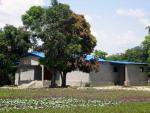Haiti Food Security Update (11/6/2008)
 Haiti recently celebrated Fet Gede, the Day of the Dead. As Matt notes, it is a time for honoring those who have come before and a reminder to love those who are still here. November 18th marks the anniversary of the Battle of Vertieres, the historic battle which ensured Haiti’s place as the first free black republic and the only country to have led a successful slave rebellion. The juxtaposition of these two holidays reminds us that life is both a gift and a struggle. In Haiti, the struggle against hunger, poverty, and instability continues.
Haiti recently celebrated Fet Gede, the Day of the Dead. As Matt notes, it is a time for honoring those who have come before and a reminder to love those who are still here. November 18th marks the anniversary of the Battle of Vertieres, the historic battle which ensured Haiti’s place as the first free black republic and the only country to have led a successful slave rebellion. The juxtaposition of these two holidays reminds us that life is both a gift and a struggle. In Haiti, the struggle against hunger, poverty, and instability continues.







